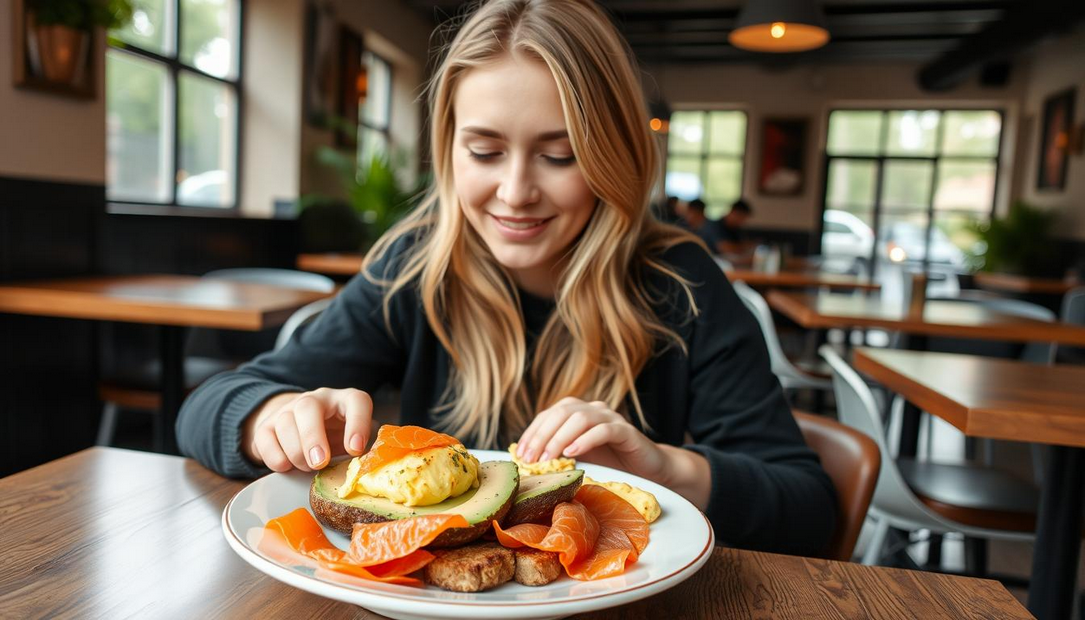India customers to view on amazon.in
Keto vs. Vegan: Which Diet is best for you?
Choosing between keto and vegan diets can feel like a puzzle. Both diets have changed American health trends. But how do you pick the right path? This article explores keto vs. vegan to help you decide which fits your goals better.
- Understanding the Fundamentals of Keto and Vegan Diets
- What Defines the Ketogenic Diet?
- Core Principles of the Vegan Lifestyle
- Historical Context and Development of Both Approaches
- The Science Behind Keto vs. Vegan
- How Ketosis Affects Your Body
- Nutritional Profile of Plant-Based Eating
- Research Findings on Both Dietary Approaches
- Key Differences Between Keto and Vegan Diets
- Health Benefits Comparison: Keto vs. Vegan
- Weight Loss Effectiveness: Which Diet Helps You Shed Pounds Faster?
- Surprising Similarities Between Keto and Vegan Approaches
- Practical Considerations: Sustainability, Cost, and Social Factors
- Personalized Decision Framework: Matching Diet to Your Lifestyle
- Conclusion: Making Your Choice Between Keto and Vegan
- FAQ
- What are the main differences between the keto and vegan diets?
- Can I lose weight on both keto and vegan diets?
- Are there any health benefits specific to the keto or vegan diets?
- Which diet is better for heart health, keto or vegan?
- What are the common challenges faced with each diet?
- Can I combine aspects of both keto and vegan diets?
- What are some budget-friendly options for keto and vegan diets?
- Are there any similarities between the keto and vegan diets?
- How can I navigate social situations with my dietary choices?
- What resources are available for further learning about both diets?

Key Takeaways
- Both diets prioritize real foods but focus on different nutritional goals.
- Which is better keto or vegan depends on your health priorities and lifestyle.
- Each approach has unique benefits and challenges worth considering.
- No single diet works for everyone—your body and goals matter most.
- Research-backed insights will guide you toward an informed choice.
Understanding the Fundamentals of Keto and Vegan Diets
Choosing between these diets starts with knowing their core rules. Let’s break down their basics to highlight the differences between keto and vegan diets.
What Defines the Ketogenic Diet?
Keto focuses on macronutrient ratios—70–80% fat, 15–20% protein, and 5–10% carbs. This forces the body into ketosis, burning fat instead of sugar. Popular foods include avocado, salmon, and nuts. Followers track net carbs closely to stay in metabolic balance.
Core Principles of the Vegan Lifestyle
Veganism eliminates all animal-derived products, including meat, dairy, eggs, and honey. It prioritizes plants like legumes, grains, and vegetables. Many adopt it for ethics or environmental reasons, though careful planning is needed to avoid nutrient gaps like B12 deficiency.
Historical Context and Development of Both Approaches
| Aspect | Ketogenic Diet | Veganism |
|---|---|---|
| Origins | Developed in the 1920s to treat epilepsy | Roots in ancient philosophies like Jainism and Pythagoreanism |
| Modern Popularity | Gained traction as a weight-loss method | Rapid growth due to environmental and ethical advocacy |
Both diets evolved from distinct goals: keto for medical purposes and veganism for ethics. Their paths show how dietary choices reflect health, morality, and cultural shifts.
The Science Behind Keto vs. Vegan
Exploring keto and vegan diets shows how they affect your body and nutrition. We’ll look at the biology and studies on their effects.

How Ketosis Affects Your Body
When you eat less than 50 grams of carbs daily, you enter ketosis. This state uses fat for energy, making ketones. At first, you might feel tired as your body adjusts. But, as time goes on, you might feel more stable and less hungry.
Key changes include:
- Switching from glucose to fat for energy
- Lower insulin levels help with fat loss
- Improved mental clarity after getting used to it
Nutritional Profile of Plant-Based Eating
Plant-based diets focus on whole foods like legumes, nuts, and veggies. They’re full of fiber, antioxidants, and vitamins. But, you need to plan for some nutrients.
Vegan diets often have:
- More fiber and phytonutrients from fruits and veggies
- Possible lack of B12, iron, and omega-3s, needing fortified foods or supplements
- More potassium and magnesium than usual diets
Research Findings on Both Dietary Approaches
“Keto and vegan diets both improve metabolic health when followed correctly, but nutrient balance matters most.” – Nutrition Today, 2023
Studies show keto diets can quickly lower blood sugar. Vegan diets are linked to less heart disease risk. But, sticking to these diets long-term is hard.

Research also finds:
- Keto’s quick weight loss but possible mineral imbalances
- Vegan diets linked to lower inflammation in some
- Results vary based on food choices and supplements
The keto vs vegan debate goes on. Both diets show the need for personalized nutrition. The benefits of keto vs vegan depend on your health goals and dietary needs.
Key Differences Between Keto and Vegan Diets
Choosing between keto and vegan diets starts with understanding their core contrasts. Here’s a clear breakdown of the differences between keto and vegan diets, simplified for easy comparison:
| Category | Keto Diet | Vegan Diet |
|---|---|---|
| Macronutrient Focus | High fat (70-80%), moderate protein, low carbs ( | Varied ratios but excludes animal products entirely |
| Food Restrictions | Limits carbs like grains, legumes, and fruits | Excludes all animal-derived foods (meat, dairy, eggs) |
| Energy Source | Body burns fat into ketones (ketosis) | Glucose from plant-based carbs and proteins |
Visual learners can reference the keto vs vegan infographic below to grasp these contrasts at a glance:

Both diets emphasize whole foods but prioritize different goals. Keto focuses on metabolic adaptation, while veganism often aligns with ethical or environmental values. Meal planning differs too—keto prioritizes avocados and meats, while vegan meals rely on grains, legumes, and nuts.
Each diet’s protein sources vary: keto allows animal proteins, whereas vegans combine beans, tofu, and quinoa for complete proteins.
Health Benefits Comparison: Keto vs. Vegan
Thinking about trying keto or vegan diets? Let’s look at their benefits of keto vs vegan through key health markers. Both diets have their own pluses and minuses to consider.
Cardiovascular Health Impacts
- Keto: May raise HDL (“good”) cholesterol and lower triglycerides. But, some studies suggest it could also increase LDL (“bad”) cholesterol.
- Vegan: Often lowers total and LDL cholesterol due to low saturated fat. Plant-based diets are heart-healthy.
Blood Sugar Management
- Keto: Low-carb intake cuts down glucose spikes, helping with diabetes. Many see a decrease in insulin dependency.
- Vegan: High fiber and low glycemic index foods improve insulin sensitivity over time.

Inflammatory Response
Keto reduces inflammation with ketones and lower insulin levels. Vegan diets fight inflammation with antioxidants from fruits, vegetables, and legumes.
Effects on Gut Health
| Aspect | Keto | Vegan |
|---|---|---|
| Fiber | Lower intake; may cause digestive discomfort | High fiber from plants supports microbiome diversity |
| Fat Sources | Focus on healthy fats like avocados and nuts | Plant-based fats plus prebiotics aid gut balance |
When looking at the pros and cons of keto and vegan diets, what’s best for you depends on your health goals. For instance, someone with diabetes might choose keto for blood sugar control. On the other hand, someone focused on heart health might prefer vegan. Always talk to a healthcare provider to find the best fit for you.
Weight Loss Effectiveness: Which Diet Helps You Shed Pounds Faster?
When looking at keto vs vegan for weight loss, results vary. The keto diet starts ketosis, which cuts hunger and boosts fat burning. Vegan diets naturally cut calories by focusing on whole plants, fiber, and water-rich foods.
Keto diets often show quick results, with a 3-5 pound weight loss in the first week. This is due to water loss and reduced carbs. Vegan diets may start slower but show better results over time. A 2020 which is better keto or vegan study in Journal of the Academy of Nutrition and Dietetics found similar 12-month weight loss averages when both diets were followed properly.
| Factor | Keto | Vegan |
|---|---|---|
| Speed | Rapid initial drop | Gradual but steady |
| Key Mechanism | Metabolic shift to fat burning | Calorie density reduction |
| Sustainability | Risk of nutrient gaps if not planned | Risk of processed food overconsumption |

“Success hinges on food quality, not just labels. Both diets work when they’re filled with vegetables, lean proteins, and whole grains.” – Dr. Monica Reinhardt, Nutrition Today
Choose based on your lifestyle. Keto requires strict carb limits but offers quick results. Vegan focuses on plant-based variety, which can aid long-term success. Neither is “better”—adherence matters most. Track progress and adjust to find your balance.
Surprising Similarities Between Keto and Vegan Approaches
At first glance, keto and vegan diets seem very different. But, they share some key principles. These similarities might surprise you.
Whole Foods Focus
Both diets emphasize eating whole foods. The keto diet focuses on veggies, healthy fats, and proteins. Vegan diets rely on plants like lentils and quinoa.
Even though they use different foods, they both avoid artificial additives. They choose natural ingredients instead.
Elimination of Processed Foods
- Keto diets avoid sugary snacks and refined carbs. They prefer real fats and proteins.
- Vegan diets exclude animal products. They also avoid processed mock meats with additives.

Mindful Eating Practices
People following both diets often eat mindfully:
- They plan their meals carefully.
- They read food labels to avoid hidden sugars or artificial additives.
- They join communities to learn more about food and cooking.
“In the keto vs. vegan debate, the shared focus on quality over convenience is transformative,” says nutritionist Dr. Lisa Green. “Both diets teach you to value ingredients that nourish your body, not just satisfy cravings.”
These similarities show that both diets aim to improve your relationship with food. They prove that focusing on quality leads to better results, even if their goals are different.
Practical Considerations: Sustainability, Cost, and Social Factors
Looking at the pros and cons of keto and vegan diets means more than just meal plans. It’s about everyday life. Both diets have real challenges, from grocery bills to social events.
Sticking to keto long-term can be tough, with cravings for carbs or getting tired of meal prep. Vegans might find it hard to get enough nutrients without animal products, needing more planning. But, both diets can be made easier with meal prep and being flexible. For example, keto followers can add low-carb veggies, while vegans can use lentils and quinoa as staples.
Cost is another big factor. Keto diets often require spending on quality meats and oils. But, you can save by buying frozen veggies or choosing chicken thighs over expensive cuts. Vegan diets might save on protein but can be pricey for substitutes like plant-based milks or meat alternatives. Apps like keto vs vegan meal plans can help find affordable options, like seasonal produce or store brands.

When it comes to social events? Plan ahead or bring a dish to share. A registered dietitian suggests:
“Communicate your needs clearly. Say, ‘I’m following a plant-based diet—do you have options with legumes?’ or ‘I avoid grains—can I swap fries for extra veggies?’”
Success depends on being adaptable. Neither diet fits everyone perfectly, but smart strategies can help. Batch cooking or finding restaurant options can make it easier. Your lifestyle, not just science, determines the best choice.
Personalized Decision Framework: Matching Diet to Your Lifestyle
Choosing between which is better keto or vegan depends on your personal needs. Ask yourself: Do you need to manage diabetes or PCOS? Or do you have different goals for endurance and strength training? Your answer will guide you to the best choice.
- Health factors: Keep track of conditions like heart disease or allergies.
- Fitness goals: Athletes focusing on endurance might prefer vegan protein, while those into strength training might choose keto fats.
- Ethics: Consider animal welfare (vegan) or environmental impact (keto’s carbon footprint).
- Cooking skills: Choose keto vs vegan meal plans that match your cooking time and skills.
- Social support: Pick plans that your family can stick to.

Get advice from a dietitian to review your health history and past diets. For example, someone with diabetes might do well on keto’s low-carb diet. On the other hand, an athlete looking to be sustainable might choose plant-based proteins. Flexible options like “plant-forward keto” mix both, like avocado-based meals with some carbs.
“There’s no one-size-fits-all. Tailor your plate to your body and values.”
Try keto vs vegan meal plans for two weeks each. Note how you feel and what you crave. Hybrid diets let you enjoy your favorite foods while keeping nutrients balanced. Your ideal diet isn’t about labels—it’s about what fits your life.
Conclusion: Making Your Choice Between Keto and Vegan
Choosing between keto and vegan diets depends on your goals and lifestyle. Both diets have health benefits if done right. The keto vs. vegan debate shows nutrition science focuses on what’s best for you, not strict rules.
Start with a two-week trial of either plan to see how your body reacts. Watch your energy and digestion to check if it’s right for you. Registered dietitians can create meal plans that fit your values or health needs. Online platforms like Precision Nutrition or Forks Over Knives offer guides based on science.
Remember, your diet can change over time. What works at 25 might not at 40 because your metabolism changes. Being flexible is key—mixing low-carb plant-based meals can be a good middle ground. Look at social media groups like #KetoVeganHybrid for ideas on blending both.
Whichever diet you pick, focus on eating whole foods and being mindful. Keep checking your goals and adjust as your life changes. Making an informed choice today doesn’t mean you’re stuck forever. Stay open to new things while keeping your long-term health in mind.
FAQ
What are the main differences between the keto and vegan diets?
The keto diet is high in fat, moderate in protein, and low in carbs. It aims to burn fat for energy. Vegans eat only plant-based foods and avoid animal products. They get energy from carbs in plants.
Can I lose weight on both keto and vegan diets?
Yes, both diets can help you lose weight. The keto diet might lead to quick weight loss by reducing hunger and changing how you burn energy. The vegan diet promotes slow weight loss with more fiber and fewer calories.
Are there any health benefits specific to the keto or vegan diets?
The keto diet can improve blood sugar control and aid in weight loss. The vegan diet lowers cholesterol and improves heart health with its antioxidants. Both diets can reduce inflammation but in different ways.
Which diet is better for heart health, keto or vegan?
The vegan diet is better for heart health because it lowers bad cholesterol. The keto diet might raise cholesterol levels due to saturated fats. However, it can also increase good cholesterol.
What are the common challenges faced with each diet?
Keto dieters might face carb cravings and the “keto flu” at first. Vegans may struggle with lifestyle changes and learning about nutrition. Both diets can be hard socially, especially when eating out.
Can I combine aspects of both keto and vegan diets?
Yes, you can mix both diets. A plant-based keto diet uses low-carb plant foods. This way, you can enjoy the benefits of both while limiting animal products.
What are some budget-friendly options for keto and vegan diets?
For keto, eat whole foods like eggs, fish, and nuts. For vegan, choose vegetables, legumes, and grains. Buying seasonal produce and bulk items can save money on both diets.
Are there any similarities between the keto and vegan diets?
Both diets focus on whole foods and avoid processed items. They encourage mindful eating and can build community support.
How can I navigate social situations with my dietary choices?
Plan ahead by talking to hosts or checking menus. Being flexible and open helps you enjoy social events while sticking to your diet.
What resources are available for further learning about both diets?
Many resources exist, like books, websites, and online communities for both diets. Infographics can also help with food choices and meal planning.








